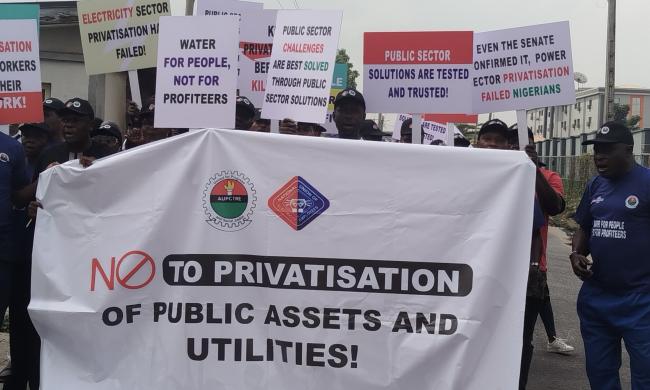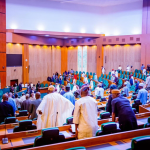Power: Employees, Six Other Groups Demand Power Privatisation Reversal

Following recurring grid collapse and epileptic power supply in the country, the Amalgamated Union of Public Corporations Civil Service Technical and Recreational Services Employees (AUPCTRE), the National Union of Electricity Employees (NUEE) and six other civic groups have demanded immediate reversal of the electricity sector privatisation and hiked electricity tariff.
The groups made the demands in a communique issued at the end of a symposium held in Lagos on Friday on the socio-economic and political implications of privatisation of public assets and utilities and the way forward.
Other groups signatory to the demands are: Renevlyn Development Initiative (RDI); Pan African Vision for the Environment (PAVE); Child Health Organisation (CHO); Committee for Defence of Human Rights (CDHR); Peace and Development Project (PEDEP) and Sustainable Research and Action for Environmental Development (SRADev Nigeria).
According to the communique, the symposium was organised with support from the DGB Bildungs Wek and Public Services International (PSI).
The groups said that participants at the symposium reviewed the electricity sector privatization which happened in 2013 and ongoing plans by President Bola Tinubu-led Nigerian government and some state governments like Lagos to privatise water assets and utilities.
The AUPCTRE National President, Comrade Benjamin Anthony, during his welcome address said that privatisation in all forms either in the water or electricity sector must be confronted by labour and civil society.
According to Anthony, the failure of the electricity sector privatization which was consummated in 2013 was predicted and the same fate would meet the water sector unless ongoing advocacy for its halt is sustained.
READ ALSO: Downgrade Band A Customers If You Can’t Ensure Minimum 20-Hour Power Supply, NERC Tells DisCos
Participants at the symposium, according to the communique, observed, “The electricity sector privatization carried out in 2013 has failed Nigeria’s over 200million people as power generation has continued to oscillate between 4000 megawatts and 5800 megawatts since the exercise was carried out.
“Incessant power grid collapse with the most recent representing the 24th crash in 2024 is a huge embarrassment to the nation.
“Nigerians now depend on their own power generation through electric generators at huge financial, environmental and health costs.
“The incessant hike in electricity tariffs and the balkanization of Nigerians into electricity bands, suggesting who should get electricity the most is unjust, creates an unnecessary class system in the society as it weighs heavily against poor Nigerians who now struggle to pay for darkness.
“The recent alarm raised by the Nigerian Senate that the electricity sector privatization has failed and should be reversed represents the reality but the Upper chamber is yet to work its talk by proposing the ideal way forward.
“There is also a growing trend whereby the power distribution companies abdicate responsibility of installing electricity infrastructure in local communities only to insist on owning those facilities after locals task themselves to put them in place.
“Ongoing plans by the federal and state governments suggesting the privatisation of the nation’s water assets and utilities supported by the World Bank and other multilateral agencies and donors have become very worrisome and unsettling to Nigerians.
“Workers continue to carry the biggest burdens of privatisation through job losses, displacements and uncertainty of job security in their workplaces.”
The groups therefore demanded, “Reversal of electricity sector privatization and a halt to discussions on privatising public assets and utilities
“Reversal of the tariff hikes in the electricity sector and the immediate end of balkanization of Nigerians into tariff bands that create class and segregation.
“The Nigerian Senate should convene a Public Hearing to allow Nigerians to air their views on the state of electricity sector privatisation.
“Halt to World Bank and IMF suggested initiatives on privatizing Nigeria’s water assets under the Public Private Partnership (PPP) or any model that puts profits over service delivery and human rights.
“Adoption of the Public Public Partnership model which has proven to be successful as against privatisation which has become a conduit pipe to fleece the nation.
“Sustained investment in human capital development in the public sector to pave way for efficiency and transparency in their operations.
“End to practices that unfairly target workers in exercises that are carried out to strengthen government institutions. Instead workers should be regularly trained and rated based on performance.”

Hafsoh Isiaq is a graduate of Linguistics. An avid writer committed to creative, high-quality research and news reportage. She has considerable experience in writing and reporting across a variety of platforms including print and online.









